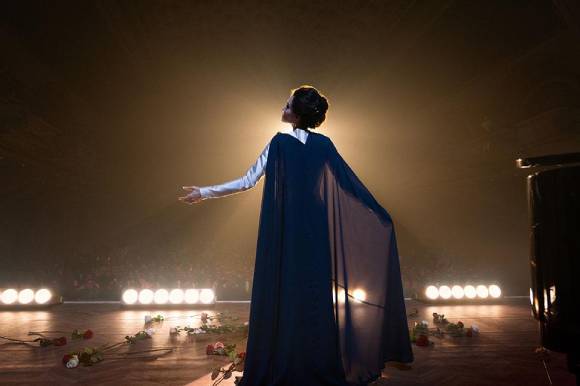The earlier films in the trilogy Jackie (2016) about the life of Jacqueline Kennedy starring Natalie Portman as Jacqueline Kennedy, and Spencer (2021) about the life of Princess Diana starring Kristen Stewart, both told the story of a famous cultural icon during a time of great drama in their lives. Maria seeks to do the same although as this is the final week before the death of Maria Callas the perspective is somewhat different.
Spencer had its world premiere at the Venice Film Festival in 2021 where it screened in the main competition and Jackie premiered in competition in Venice in 2016. So it comes as no surprise that Maria has also scored a competition slot this year.
Maria tells the tumultuous and tragic story of the life of one of the world’s greatest female opera singers during her final days in 1970s Paris. Lararin in his director’s statement said “Maria Callas, the greatest opera singer of all time, undoubtedly had a most unique, beautiful, and tormented life. This is the story of her last days, a celebration depicted through memories, friends, and, most importantly, her singing.”
The film opens with a brief glimpse of the final scene in Maria’s life as her body is taken away after she dies in her lavish Paris apartment alone with just her two servants, her butler, Ferruccio played by Pierfrancesco Favino, and her housekeeper played by Alba Rohrwacher, and without any of the men in her life who loved her or the fans who adored her.
Angelina Jolie as Maria Callas gives what just might be the most impressive performance of her life. Jolie herself has many of the characteristics of a diva in real life and it is hard to imagine any actress who didn’t possess that larger than life diva-esque quality being able to embrace the character of Callas. Callas as portrayed by Jolie is imperious and vulnerable at the same time. Jolie undertook six months of classical opera training for the role, actually sang many of the arias during the filming although for the vocals of Callas at the height of her career actual recordings of Callas were sued.
Callas has lost her voice and has stopped performing. Unlike today where a great opera stars extend their stage lives by changing the kind of parts they sing and sometimes continuing to sing into their 80s, in the 1970s once a singer’s voice was no longer what it once was their career was over.
Callas dreams of making a comeback so we see her in her final days visiting a coach and trying to decide if she might find her voice again and perform. We see much of her earlier life including her greatest stage triumphs and her greatest loves through flashbacks. But Callas has become so addicted to prescription drugs that her health has been destroyed and she constantly hallucinates. Larrin takes the audience on a journey through her mind where we do not know for sure if what we see is really happening or if Callas is hallucinating.
Much of the film was shot in Budapest which stood in for Paris and the interiors are lavish and beautiful. Cinematographer Ed Lachman, who was nominated for an Oscar for his work on Larrain’s El Conde, has done another outstanding job on Maria. Costume designer Massimo Cantini Parrini has produced stunning gowns for Callas’s stage roles as well as dressing Jolie elegantly throughout.
Maria (Italy / Germany / USA)
Directed by Pablo Larrain
Cast: Angelina Jolie, Pierfrancesco Favino, Alba Rohrwacher, Haluk Bilginer, Kodi Smit-McPhee, Valeria Golino, Stephen Ashfield, Valeria Golino, Vincent Macaigne, Lydia Koniordou, Aggelina Papadopoulou




















